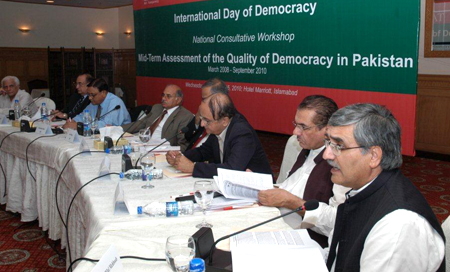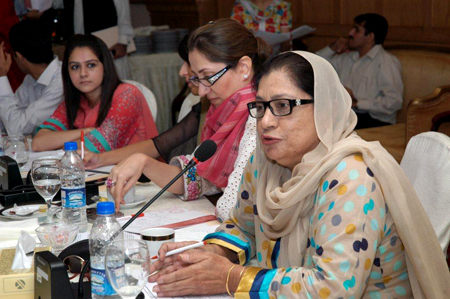|
|
| |
| EVENTS |
|
|
> Mid-Term Review of Quality of Democracy in Pakistan gets a 45% Score
|
|
|
|
| |
Islamabad, September 15; The Mid-Term Assessment of the Quality of Democracy in Pakistan received an average score of 45%. Released on the International Day of Democracy and at the completion of the mid-term of the tenure of elected Parliament and the Government of Pakistan (September 16 and September 24, 2010 respectively), the Democracy Assessment Group (DAG), convened by the PILDAT, carried out a comprehensive assessment based on an international democracy assessment framework reflecting the experience of democracies around the world. |
|
| |
Civil Society and Popular Participation in Pakistan, one of the 4 key pillars of the international assessment framework, received the highest score of 53%. This has been followed by Citizenship, Law and Rights, with the score of 46%. The remaining two key pillars, Representative and Accountable Government and Democracy beyond the State receive the score of 43% each.
|
|
| |
The key message of the Mid-Term Assessment of the Quality of Democracy in Pakistan is that the status of Constitutional and institutional arrangements of Democracy are comparatively better than in most parts of our history. We have the basic ingredients of Democracy in place such as an independent Judiciary, independent and diverse media, a sovereign and inclusive Parliament in which the opposition is given an important role and a free open civil society. But the state of governance, rule of law, accountability and integrity in public office are not satisfactory and need urgent improvement. |
|
| |
Effectiveness of civilian control over the armed forces gets the lowest score of 26% of the overall assessment which calls for a serious reflection both by the civilian and military leadership, in the assessment of the Group. An elected, democratic government must be able to exercise credible and effective control of the military. In the opinion of the Group, Pakistan is far from this stage. |
|
| |
The representativeness of the media as reflecting the diversity of public opinion received the highest score of 67% in the overall assessment. The Role of Media generally received the overall score of 58%. The independence of media received a score of 62 %; the investigative ability of the media and civil society received a score of 62%. Relatively a lower score, i.e., 52%, was received by the freedom of private citizens from the intrusiveness of media which underscores the need for media to be a little more sensitive to the privacy of a citizen. |
|
| |
The objective of the Assessment of the Quality of Democracy in Pakistan is to identify strengths and achievements and to also identify the weaknesses so as to propose reforms to address those weaknesses. Drawn from all provinces and regions of Pakistan, the 24-member Democracy Assessment Group or DAG represents the broad diversity of the Pakistani Society. Province, Gender, Profession, Language and Political Affiliation are some of the features of the DAG members� profiles. The framework and the assessment by the DAG have been shared in two national workshops comprising about 50 participants each from different walks of life in Pakistan. |
|
| |
The Group noted with satisfaction some of the major accomplishments of the democratic order in 2 � years which include Restoration of Judiciary; Unanimous passage of the 18th Constitutional Amendment; 7th National Finance Commission (NFC) Award; Making the Public Accounts Committees (PACs) more effective; Recognition of the Role of Opposition in the Parliament and the Provincial Assemblies; Constructive Role of the Opposition; Aghaz-e-Huqooq-e-Balochistan package and the Gilgit-Baltistan Empowerment and Self-Governance Order, 45%9, etc. |
|
| |
In noting challenges to Democracy, the Group highlighted key areas of concern including Socio-Economic Challenges; Terrorism; Perceptions of Corruption and delay in instituting an Accountability Mechanism; A weak Performance Legitimacy of the Government; Perception of Confrontation between the Supreme Court and the Government; Weak Political Parties and Intra-party Democracy; Need to strengthen Parliamentary Oversight of the Executive; the Perception of Inadequate Dividends of Democracy for Public; the Need to Channelize the Potential of Youth for Democracy and the Role and Responsibility of the Media, etc. |
|
| |
The Group was unanimous in the firm belief that the way forward for Pakistan is to sustain, refine and strengthen the democratic system. Disappointment at the performance of elected legislatures and governments in a particular phase cannot become the justification for abandoning the democratic process, believed the Group.
It is the next phase that becomes the far more formidable challenge, believed the Democracy Assessment Group. The chief challenge is of translating new Constitutional framework and consensus sanctified on paper into concrete, practical, visible benefits for the citizens and to use democracy to conduct comprehensive reforms, to significantly improve governance, ensure transparency and accountability, and enforce the rule of law without fear or favour. If democracy continues to be used to perpetuate corruption and nepotism, prolong malpractices and mis-governance, it is not just democracy which will face old or new threats but the very existence of Pakistan will be put at grave risk, the Group opined.
A detailed Executive Summary containing detailed Score Card, Members of the Democracy Assessment Group, can be downloaded here.
A complete report on Mid-Term Assessment of the Quality of Democracy in Pakistan is planned to be released on September 25, 2010, the day the elected political Government completes 2 � year of its 5 year term.
The Score Card was released today by the Democracy Assessment Group at a National Consultative Workshop and Media Briefing. A cross-section of society including MPs, political parties, analysts, youth, labour and other groups participated.
This is the first time that the Democracy Assessment framework has been used to evaluate democracy in Pakistan. This review, therefore, provides a baseline on the subject on a criteria that is internationally comparable. This review, to be carried out periodically in Pakistan by PILDAT, should therefore, be viewed as a work-in-progress. The framework used to assess the quality of democracy in Pakistan is a tool to promote democratic reform. The framework does not assess the government alone but assesses the entire society looking at how democratic is the country and society of which the Government is a part.
PILDAT gratefully acknowledges the support and cooperation of the Democracy Assessment Group. PILDAT sought and received partial support of the Foundation for the Future in carrying out the assessment of democracy which it gratefully acknowledges. |
|
| |
|
|
| |

|
|
| |
|
|
| |

|
|
| |
|
|
| |

|
|
|
|
|
|
|
|
|